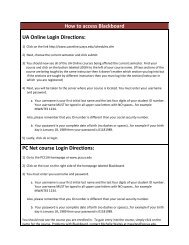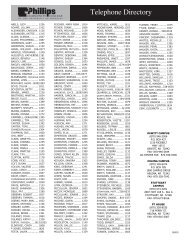College Catalog 2009-2010 PDF - Phillips Community College
College Catalog 2009-2010 PDF - Phillips Community College
College Catalog 2009-2010 PDF - Phillips Community College
Create successful ePaper yourself
Turn your PDF publications into a flip-book with our unique Google optimized e-Paper software.
•<br />
•<br />
•<br />
In the Password box, enter your password which is your<br />
full date of birth (mmddyyyy)<br />
Click on “Login”<br />
your “My Blackboard” appears<br />
<strong>College</strong> or University Parallel Curricula<br />
Many students have plans for completing four years of college<br />
education in a senior college or university. At <strong>Phillips</strong> <strong>Community</strong><br />
<strong>College</strong>, these students have an opportunity to begin work which<br />
will apply toward the completion of requirements for a major<br />
field of study in a four-year institution. Advisors assist students<br />
in the selection of courses leading to the proper sequences.<br />
Students who plan to attend a particular college should consult<br />
the catalog of that college for information concerning required<br />
and elective courses. Graduates of <strong>Phillips</strong> <strong>Community</strong> <strong>College</strong><br />
who achieve good academic records are admitted readily to the<br />
junior year of most four-year colleges and universities.<br />
Occupational Curricula<br />
Technological advances during recent years have greatly influenced<br />
modern society at work and in the home. Technical<br />
knowledge and skills are changing at a rapid rate as business and<br />
industry become even more complex.<br />
Along with this rapid expansion of technical knowledge comes<br />
a multitude of new opportunities not imagined in earlier years.<br />
This explosion of technology is demanding a supply of many<br />
more technically competent people to fill the newly created positions.<br />
Those who will enter the work force must be educated and<br />
trained. Those who are already on the job must be continuously<br />
upgraded and updated in their knowledge and skills.<br />
The career pathway of the two-year occupational programs are<br />
designed to provide the technical knowledge and skills necessary<br />
for successful employment at a semi-professional level within<br />
various fields of business and industry. The broad technical<br />
experience provided, along with the required mathematics<br />
and science, should give individuals the necessary technical<br />
foundation and flexibility to adapt to the ever-changing world<br />
of technology.<br />
In an effort to serve the total community and its wide range of<br />
educational needs, <strong>Phillips</strong> <strong>Community</strong> <strong>College</strong> also developed<br />
a selected number of career pathways which are one year certificate<br />
programs. These selected programs are to be preparatory<br />
in nature and designed for those students wishing to further<br />
their education within a specific occupational area for future<br />
employment.<br />
A number of short-term courses are offered as evening classes<br />
for those wishing to update themselves in their present field<br />
of work. These courses are offered on the basis of community<br />
need, interest, availability of qualified instructors, equipment<br />
and budget limitation.<br />
Academic Skills Curricula<br />
For students who come to <strong>Phillips</strong> <strong>Community</strong> <strong>College</strong> with<br />
a lack of the basic academic skills necessary to do satisfactory<br />
college level studies, the college offers an academic skills curriculum.<br />
Students who correct academic deficiencies through<br />
such courses will be encouraged to continue their studies in<br />
other college programs.<br />
The Academic Skills Department also operates a computer lab<br />
to assist students with instruction designed to improve existing<br />
skills in reading, writing, and arithmetic.<br />
<strong>Community</strong> Services and Continuing Education<br />
<strong>Community</strong> Service has become widely recognized as a major<br />
function of <strong>Phillips</strong> <strong>Community</strong> <strong>College</strong>. Through <strong>Community</strong><br />
Service and Continuing Education Programs individuals have<br />
opportunities to participate in educational, cultural, professional<br />
and recreational services. The host of <strong>Community</strong> Service and<br />
related programs are designed to provide:<br />
1. Continuing education opportunities for individuals wanting<br />
to upgrade their present skills or explore new occupational<br />
opportunities.<br />
2. Cultural and community enrichment programs for the individual<br />
or groups seeking to enhance the quality of community<br />
life.<br />
3. Resources for business, industry and professional groups<br />
needing to supplement their own training and development<br />
programs.<br />
4. Adult education opportunities for individuals wanting to<br />
continue their education on an elementary or high school level,<br />
or prepare for a High School Equivalency Diploma Examination.<br />
Programs are offered throughout the year to meet community<br />
needs as they arise. These may be in the form of short seminars,<br />
semester-long classes or extended certificate or diploma<br />
curricula.<br />
In addition to <strong>Community</strong> Service and Continuing Education<br />
classes, the <strong>College</strong> extends other services to the community.<br />
Through the college, personnel are available to serve as speakers<br />
for business, professional, civic, service, educational, social, and<br />
other groups. Additionally, college facilities are made available<br />
at no cost to community groups when the need arises.<br />
<strong>Community</strong> Service and Continuing Education classes are open<br />
to all persons. There are no educational prerequisites which a<br />
person must satisfy.<br />
Adult Education<br />
The Adult Education program is designed to allow students<br />
over the age of sixteen who have not completed high school<br />
studies the opportunity to acquire the skills necessary to pass<br />
the General Educational Development (GED) test or to meet<br />
other educational goals. The Adult Education/Learning Skills<br />
Department offers two components in this curricula:<br />
1. Adult Basic Education (ABE) to teach basic literacy in reading,<br />
language skills, and math.<br />
2. Adult Secondary Education (ASE) to teach the reading, English<br />
and math skills necessary to pass the GED test.<br />
Both components (ABE & ASE) of the program incorporate<br />
life skills and counseling services necessary for the growth and<br />
development of the adult learner.




